
From Name planted trees for you, Recipient Name.
See your Tree Certificate attached, and click here
to learn about One Tree Planted's work.
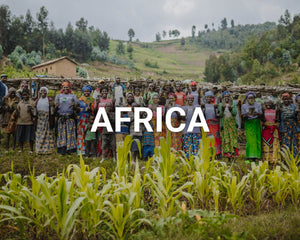
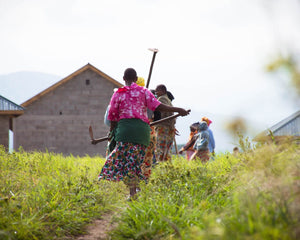
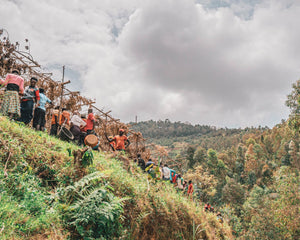
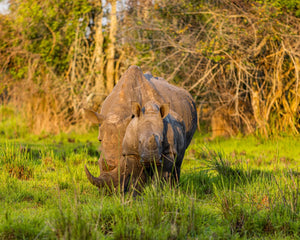
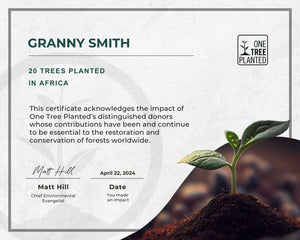
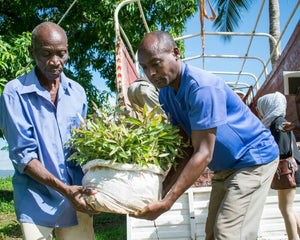
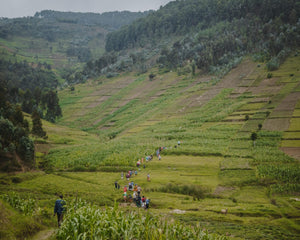
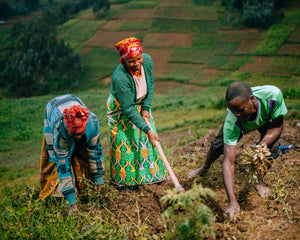
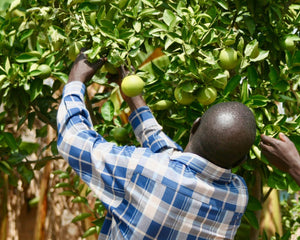
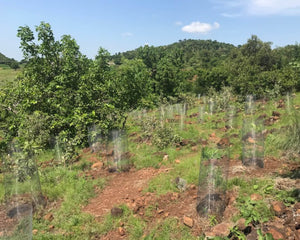
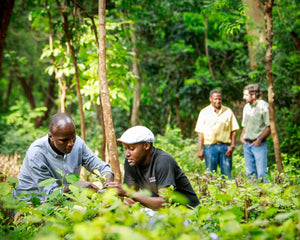
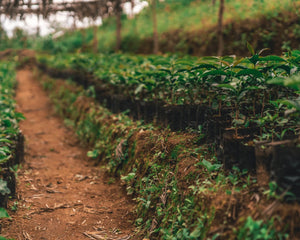
From the lush Congo Basin rainforest to coastal mangrove forests in the south, Africa's forests are home to a breathtaking range of ecosystems that play an irreplaceable role in our planet's health and the well-being of countless communities. Planting trees in Africa impacts communities and landscapes alike. Learn more
With your help, we will:
Looking to plant trees every month? Join The Grove.
The forest landscape in Africa is a mesmerizing tapestry of nature's diversity, spanning from the lush rainforests of the Congo Basin to the iconic acacia-dotted savannas and the unique miombo woodlands. These forests provide essential ecosystem services, regulating local and global climates, controlling water flows, and supporting the livelihoods of millions who rely on these forests for sustenance, medicine, and cultural heritage.
Approximately 21% of Africa's tropical forests have been lost over the last century, and in some regions (West and East Africa in particular), deforestation has exceeded 80%. People in these regions often depend heavily on forests for their food, shelter, water, and livelihoods, making restoration of Africa's forests an even more critical undertaking.
Our planting projects in Africa focus on restoring wildlife habitat, soil quality, and critical watersheds, all while improving the lives of the communities who rely on the forests the most. Our planting partners promote sustainable agroforestry and educate farmers about the benefits of improved forestry practices, helping communities to develop sustainable sources of food, fuel, and income.
A personalized tree certificate (see gallery) to say thanks for your donation. We’ll also send you a report on the Africa project that your donation was allocated to, so you can better understand your trees' impact on the environment and communities.
Every tree we plant will have an impact on the surrounding ecosystem, and must be selected with great care. We work with our planting partners to ensure the species we select will provide the intended benefits for biodiversity and communities.
Our other African projects, such as in South Africa, plant a range of native species such as Acacia karoo, Brachylaena discolor, and Myrsine africana. These trees will protect water bodies and provide shade, green spaces and windbreaks for the local communities, helping them to adapt to climate change impacts.
Our other African projects, such as in South Africa, plant a range of native species such as Acacia karoo, Brachylaena discolor, and Myrsine africana. These trees will protect water bodies and serve as shades, green spaces and windbreaks for the local communities to adapt to impacts of climate change. These trees can also have medicinal purposes to promote local health.





We believe in complete transparency regarding how your donation dollars are utilized. We work together with our partners to determine how we can best support them within our reforestation model. Each project has a budget that covers specific primary costs. To learn more about how our funding works, visit the Our Model page.
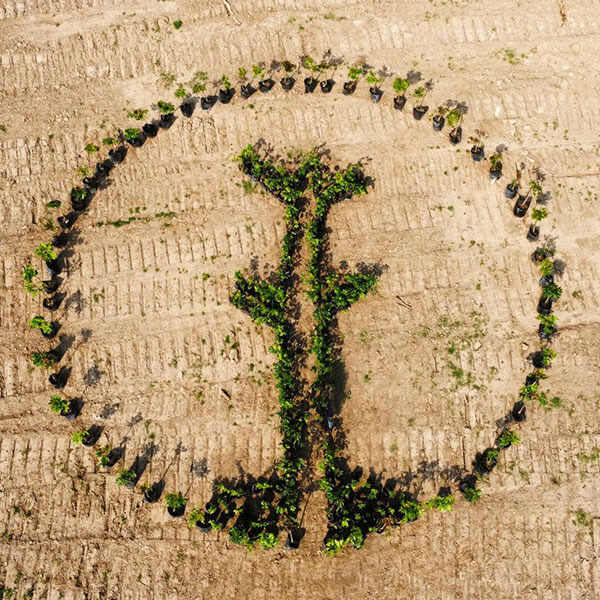
We work with local planting partners in more than eighty countries, across diverse ecosystems, to fund large-scale, high-impact projects.
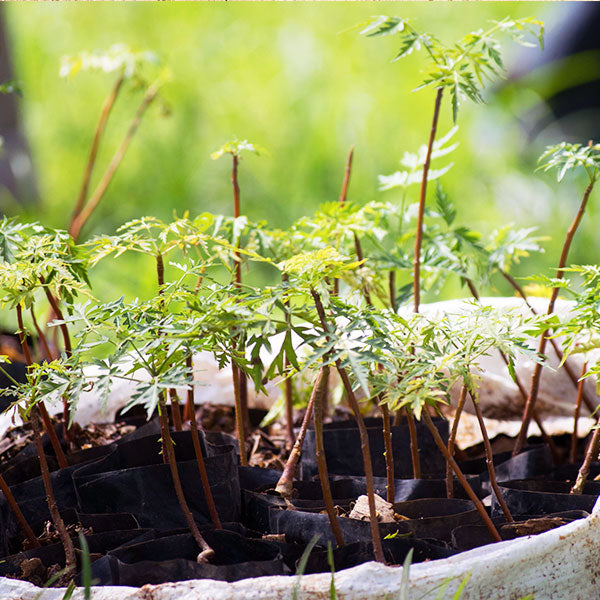
One Tree Planted is a 501(c)(3) non-profit environmental charity that makes it easy for individuals, businesses, and foundations to get involved and make an impact around the world.
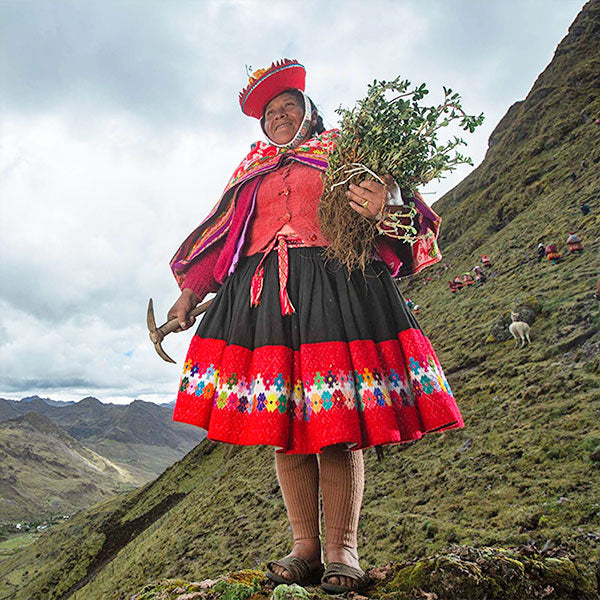
Every tree planted with One Tree Planted makes a positive impact. Together, we can restore forests, create habitat for biodiversity, and make a positive social impact.
Every One Tree Planted project begins with a detailed proposal from a local planting partner, which details where, why, and how the trees will be planted. After planting wraps up, our Monitoring, Reporting and Verification Team works closely with our reforestation partners to map and monitor their growing trees. This allows us to analyze the impact the trees will have on overall forest health, biodiversity, and surrounding communities.
We take donor impact reporting seriously, and require our reforestation partners to track and report specific metrics for every project that is completed. Click on the button below to view a planting report from a recent reforestation project.

Planting trees in Africa will help restore vital agroforestry and native forest cover, impacting communities with important fruit trees and more with every donation. Click on the reforestation map to discover a selection of our Africa and the impact they will have for generations to come!

Forests provide jobs to over 1.6 billion people, absorb harmful carbon from the atmosphere, and provide key ingredients for 25% of all medicines. Have you ever taken aspirin? The active ingredient in aspirin comes from the bark of a tree! At One Tree Planted we focus on the 6 Pillars of Reforestation. These pillars are the foundation of why planting trees is such a significant action to take.
Trees help to clean the air we breathe. Through their leaves and bark, they absorb harmful pollutants and release clean oxygen for us to breathe. In urban environments and other ecosystems, trees absorb pollutant gases such as nitrogen oxide, ozone, and carbon monoxide, and sweep up particles such as dust and smoke. Increasing levels of carbon dioxide caused by deforestation and fossil fuel combustion trap heat in the atmosphere.
Trees play a key role in capturing rainwater and reducing the risk of natural disasters such as floods and landslides. Their intricate root systems act as natural filters, removing pollutants and slowing down the water’s absorption into the soil. This process prevents harmful waterslide erosion and reduces the risk of over-saturation and flooding. According to the UN Food and Agriculture Association, a mature evergreen tree can intercept more than 15,000 litres of water every year.
A single tree can be home to hundreds of species of insects, fungi, mosses, mammals, and plants. Depending on the type of food and shelter they need, different forest animals require different types of habitat. Without trees, forest creatures would have nowhere to call home.
From arborists to loggers and researchers, the job opportunities provided by the forestry industry are endless. We don’t just rely on trees for work, though. Sustainable tree farming provides timber to build homes and shelters, and wood to burn for cooking and heating. Food-producing trees provide fruit, nuts, berries, and leaves for consumption by both humans and animals, and pack a powerful nutritional punch.
Did you know that hospital patients with rooms overlooking trees recover faster than those without the same view? It’s impossible to ignore that feeling of elation you get while walking through a calm, quiet forest. Trees help reduce stress and anxiety, and allow us to reconnect with nature. In addition, shade provided by canopy cover helps to protect our skin from the ever-increasing harshness of the sun.
Trees help cool the planet by absorbing and storing harmful greenhouse gases such as carbon dioxide into their trunks, branches, and leaves — and releasing oxygen back into the atmosphere. In cities, trees can reduce ambient temperatures by up to 8° Celsius. With more than 50% of the world’s population living in cities — a number expected to increase to 66% by the year 2050 — urban trees are more important than ever.
One Tree Planted has planted trees in six global regions: North America, Latin America, Africa, Asia, Europe, and The Pacific. Every reforestation project has a unique impact on forests, communities, biodiversity, and the environment. Check out the incredible impact some of our past projects have made!
Read more
This project uses a holistic approach to environmental restoration that empowers communities to restore sustainable and productive landscapes through appropriate tree cultivation. With the collaborative spirit of the communities in Kitui County, Kenya, we have planted more than 50,000 trees thus far. The diverse species range includes agroforestry trees such as Acacia mellifera, Grevillea robusta, Melia volkensii, Azadirachta indica, Tamarindus indica, Calliandra calothyrsus, and Macadamia spp. Additionally, we have introduced fruit trees like avocados and mangoes.
The project will significantly reduce the pressure of extractive timber harvesting by communities that live in buffer areas near dryland forests, contributing to richer habitats for biodiversity. The cultivation of fruit and medicinal trees will increase the population of invertebrate pollinators, particularly bees and butterflies. The project will increase the conservation of wild food plants such as chocolate berry, and enhance their potential to combat food insecurity in the area.
Throughout this project, women will be empowered to make an impact in their communities through farm restoration. Because of the restoration, women will require less travel time to harvest fuel for cooking, and have more time to spend on other activities.
Read more
The goal of this project is to improve forest cover in an area that has been deforested due to competing land use from oil and gas finds and rising interest in rubber plantations coupled with rapid urbanization. Local communities and smallholder farmers are experiencing land loss for food crop farming, declining soil fertility, increased flooding, and increased drought conditions that undermine their ability to feed and support themselves through farming.
Our previous collaboration with Goshen Global in the western region of Ghana stands as a testament to what can be achieved. Through that partnership, we planted over 180,000 trees, incorporating native species such as Khaya grandifolia, Terminalia superba, and Terminalia ivorensis, and fruit trees like citrus, papaya, and guava.
Integration of trees in farms will involve light shade trees, nitrogen-fixing trees, fruit trees, and non-timber forest plants. These trees will be introduced into the farmlands at varied intervals to enhance biodiversity as well as improve the soil and surrounding ecosystem. As the trees mature, farmers can benefit from products like fruits, spices, and medicines that they can sell.
From our past project with Goshen Global, we witnessed transformative impacts. More than 5,000 individuals benefited directly, and we facilitated the creation of around 100 jobs, spanning full-time, part-time, and seasonal roles.
Community members will also be mobilized to introduce trees in their communities, with areas such as school compounds, roadsides, and markets being part of the planting initiative.
Read more
The long-term goals of this planting project are to halt soil erosion completely, build up a soil layer inside the forests, and provide habitat for wildlife. Additionally, the goal is to provide firewood and timber for locals in a self-managed forest that will be in a condition enabling Assisted Natural Regeneration at a later stage. Another general goal is to enable the growth of additional successor species to live in the forests, including mushrooms, grasses, and mammals.
In our previous collaborations in Mzimba and Misuku, we've seen first-hand what can be achieved when working hand in hand with dedicated partners. Through our efforts, more than 600,000 trees have been planted. These aren't just any trees; they're a diverse array encompassing all indigenous forestry species, including Albiza Versicolor, Senegalia Polyacantha, Afzelia Quanzensis, Khaya Nyasica, Sericea, Tephrosia Vogelii, and fruit trees such as Mango, Oranges, Tangerines, Avocado, Pawpaw, Apples, Guava, Mulberry, and Mexican apple.
This project will employ local community members at all levels through nursery work, fence building, soil restoration activities, planting seedlings, watering, and more. Our past initiatives have involved around 140 women and supported more than 600 beneficiaries. Furthermore, they've created over 290 full-time and part-time jobs, offering a significant economic boost to these regions. Many of these employees are women, providing them with greater financial freedom. This project will also support many young people, mainly girls, with food, clothing, school fees, additional courses, and counseling. All workers will be empowered with knowledge on the importance of indigenous trees, how to grow their own seedlings, and how to properly care for planted trees.